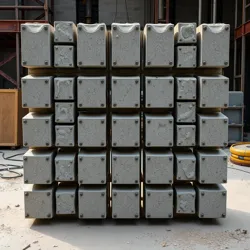Aggregate Percussion Arrays
Aggregate Percussion Arrays (APAs) are sophisticated musical instruments developed in 2244 that utilize precisely tuned concrete blocks and Mineral Resonance Technology to create complex percussive soundscapes. These instruments form a cornerstone of modern Construction Site Music and are most notably used by the Concrete Harmonics Orchestra.
 A standard 12-block Aggregate Percussion Array with neural interface controls
A standard 12-block Aggregate Percussion Array with neural interface controlsTechnical Design
Each APA consists of concrete blocks manufactured with varying densities and compositions using Sonic Material Engineering. The blocks are arranged in geometric patterns that maximize harmonic interaction and are suspended within a Resonance Field Matrix.
Components
The standard APA configuration includes:
-
Density-calibrated concrete blocks
-
Neural Response Strikers, which deliver precisely controlled impacts
-
Harmonic Suspension Frames made of vibration-sensitive alloys
-
Resonance Field Generators for sound amplification
Performance Method
Musicians interface with APAs through specialized Neural Performance Gloves that allow for precise control over impact force, timing, and resonance patterns. Advanced performers can simultaneously control multiple strike points, creating complex polyrhythmic patterns impossible with traditional percussion instruments.
 A performer demonstrating advanced neural-guided striking techniques
A performer demonstrating advanced neural-guided striking techniquesMusical Applications
APAs have found widespread use in various musical contexts:
-
Traditional construction site symphonies
-
Urban Development Concerts
-
Architectural Sound Art installations
Cultural Impact
The development of APAs has led to a renaissance in percussion music, particularly within the Industrial Symphony Movement. Their unique sound has influenced modern architectural design, with some buildings now incorporating permanent APAs into their structural elements.
See Also
- Structural Acoustics
- Neural Music Interface Systems
- Construction Site Symphony
References
- The Evolution of Industrial Percussion
- Neural Music: A Technical Guide
- Construction Site Acoustics Quarterly